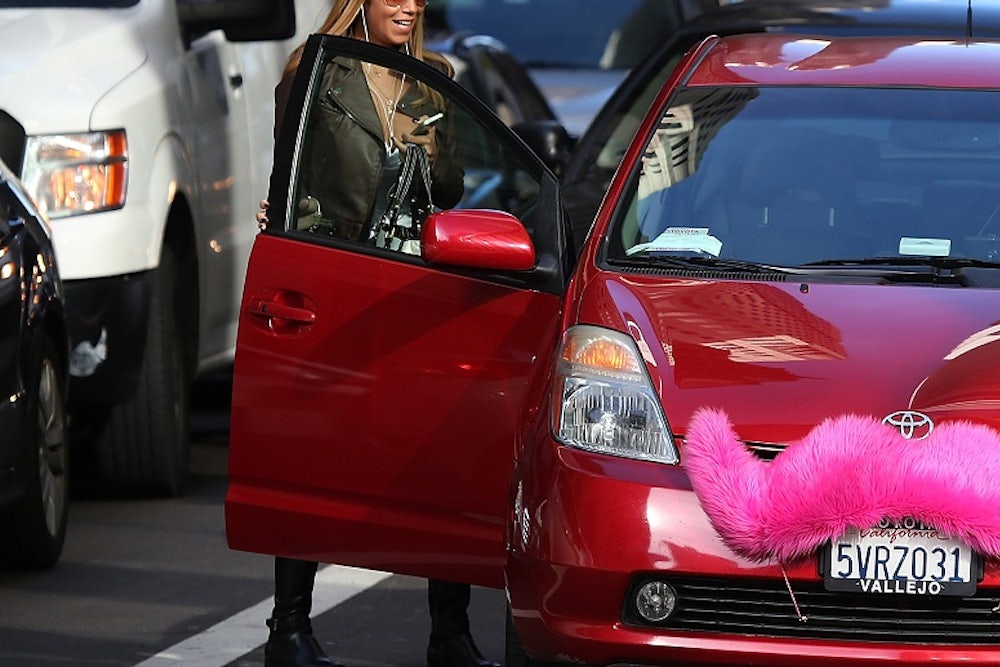On Tuesday afternoon, The Verge reported a big scoop: Through numerous interviews and internal documents, senior reporter Casey Newton had discovered “Uber’s playbook for sabotaging Lyft.” The Twittersphere freaked out. “Uber is not a very ethical company. Part infinity,” Buzzfeed’s Andrew Kaczynski tweeted. The co-editor at TechCrunch, Alexis Tsotsis, wrote, “This has to be an FTC violation.” Others called Uber’s playbook a “dirty trick,” “disgusting,” and a host of other names.
It’s not hard to imagine Uber using a nasty, maybe even illegal, strategy to gain an unfair advantage on their competitors, particularly Lyft. After all, in January, Uber employees were caught scheduling rides with competing firms and then cancelling them at the last minute. As The New Republic’s Noam Scheiber has noted, Uber has also not exactly played nice with regulators.
So, when Newton reported Uber’s plan for “sabotaging Lyft,” the media was already primed to view their strategy as a cheap move. Except when you actually read Newton’s piece—which does have some terrific reporting—it’s hard to see what the company did wrong. Newton reports about a special project with the codename SLOG (Supplying Long-term Operations Growth) in which Uber put together a team, equipped them with company phones and credit cards, and told them to take rides with Lyft drivers. During those rides, the Sloggers, as Uber called them, would inquire about the driver’s happiness with Lyft and try to convince them to switch to Uber. Knowing that Lyft would catch on to these tactics, Uber instructed the Sloggers to use different physical locations to avoid detection. Basically, Uber has been poaching Lyft drivers by recruiting them while they’re working.
For all the uproar this strategy has caused, it seems innocuous. I can’t imagine how it would be illegal. And if there is some rule against it, the problem is with the rule, not Uber. It’s also hard to see how this is “anti-competitive” behavior. Companies try to steal one another’s workers all the time. The threat of leaving for a different company gives workers leverage to demand higher wages for their current employer. This is how a competitive market works. The only argument I’ve seen against Uber’s strategy with any merit comes from Jason Fried, the founder and CEO of Basecamp, in a series of tweets.
I *understand* the @uber recruiting angle. A $10 ride is the cheapest way to get in front of a strong lead/candidate…
— Jason Fried (@jasonfried) August 26, 2014…it's just more about how it all /feels/. Like someone walking into your physical office, pulling up a chair, and recruiting your people…
— Jason Fried (@jasonfried) August 26, 2014…you'd surely kick them out of your office. You might even call the cops if they didn't leave…
— Jason Fried (@jasonfried) August 26, 2014…It doesn't matter if they left a $10 bill in the tip jar on their way out.
— Jason Fried (@jasonfried) August 26, 2014That’s awfully weak. If the biggest problem with Uber’s strategy is the location of the recruitment, that’s not “sabotage” or a “dirty trick.” Maybe it’s disrespectful, but that’s about it. Workers use company hours and resources (like phone and email) all the time to talk with other firms about future employment. As for the example Fried gives, once you've kicked the recruiter out of your office, the employee could set up a meeting elsewhere.
The hostile reaction to Uber’s strategy misses the best part of the project: It empowers the drivers. When employers compete, workers win. That’s exactly what’s happening in the war between Uber and Lyft. For instance, Uber offers incentives, like free gas cards or even cash, to Lyft drivers to switch teams. If Lyft wants to stay competitive, they’ll have to do the same.
Once upon a time, big tech companies—Apple, Intel, Adobe and Google—faced a similar situation, but instead of competing with each other, they agreed to not recruit each other’s’ top employees. This collusion successfully held down worker wages, but it also is illegal. Just a few weeks ago, a judge rejected as too small a proposed settlement of $324.5 million between those firms and affected workers.
Uber and Lyft could follow in the path of those tech companies and agree not to poach each other’s drivers. Eventually, maybe the Department of Justice would catch the two firms colluding and the affected drivers would receive their stolen wages. But it’s a lot easier if Uber, Lyft and other ridesharing companies compete for each other’s workers now. If Uber’s tactics are a bit unorthodox, so be it.
